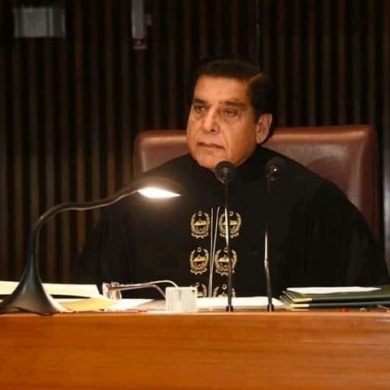The Supreme Court on Thursday indefinitely adjourned the hearing on a series of petitions challenging the trials of civilians in military courts.
Presiding over the proceeding, Chief Justice of Pakistan (CJP) Umar Ata Bandial said the Army would not be allowed to take any “unconstitutional steps”.
The bench, which heard the case, included Justice Ijazul Ahsan, Justice Munib Akhtar, Justice Yahya Afridi, Justice Sayyed Mazahar Ali Akbar Naqvi, and Justice Ayesha A. Malik.
During the hearing, the CJP expressed regret and grief over the events of May 9, while emphasizing that he did not want a situation wherein “the army raises their weapons against the people of Pakistan.”
The Chief Justice lauded the restraint shown by the armed forces despite the violence on May 9, particularly in Mianwali, where army installations were attacked. However, he firmly stated that the military would not be permitted to take any illegal actions.
In response to the assurances given by Attorney General for Pakistan (AGP) Mansoor Usman Awan, CJP Bandial affirmed that no military trials of civilians would be conducted.
At the outset of proceeding, petitioner Aitzaz Ahsan drew attention of the CJP to recently-proposed amendments to the Official Secrets Act, 1923.
He raised concerns about the empowerment of intelligence agencies to conduct raids and arrests without search warrants, violating the sanctity of people’s homes.
He suggested that the court make a virtual full court to hear this case.
CJP Bandial inquired whether the amendment had been passed.
On being told it was still a bill, he responded: “Let’s see how the other two factions of the Parliament react to it.”
“The chief justice cannot take notice at his discretion, he said.
At this, Ahsan urged him to take suo moto notice as the senior-most member of the court.
“You should consult your other judges,” he requested.
At this the CJP thanked him.
In the aftermath of violent riots that swept across the country on May 9, the government’s announcement to conduct military court trials for those involved in attacking military installations had triggered controversy and legal challenges.
Prominent figures, including PTI Chairman Imran Khan, Khawaja, and legal expert Aitzaz Ahsan, along with five civil society members, including Piler Executive Director Karamat Ali, have taken the matter to the apex court, seeking a declaration of the military trials as “unconstitutional.”
Former Chief Justice of Pakistan (CJP) filed a petition through his lawyer, arguing that Section 2(1)(d)(i) and (ii) of the Pakistan Army Act were in violation of the fundamental rights guaranteed by the Constitution and urged the court to strike them down.
In addition, five members of civil society from different cities, represented by Siddiqi, appealed to the apex court, asserting that the trial of civilians in military courts is illegal.
The decision to subject civilians to military court trials has been met with widespread concern, with critics arguing that such a move undermines the principles of justice and due process.



